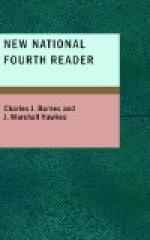* * * * *
Language Lesson.—Let pupils make out an analysis for so much of the last three lessons as may be included under the subject—“A Night at the Cottage.”
Suggestion.—The analysis of simple subjects, and their treatment orally or in writing, are valuable exercises, and should be assigned to pupils as frequently as possible during the whole of their school life.
* * * * *
LESSON XLVIII.
mel’o dy, sounds pleasant to the ear.
chant’ed, sung in a simple melody.
witch, a person supposed to deal with evil spirits.
trump’et, a hollow piece of metal used to make music.
har’mo ny, the effect produced by uniting
two or
more different parts in music.
* * * * *
WHAT THE CHIMNEY SANG.
Over the chimney the night-wind sang
And chanted a melody no one knew;
And the Woman stopped, as her babe she
tossed,
And thought of the one she had long since
lost:
And said, as her tear-drop back she forced,
“I hate the wind in the chimney.”
Over the chimney the night-wind sang
And chanted a melody no one knew;
And the Children said, as they closer
drew,
“’Tis some witch that is cleaving
the black night through—
’Tis a fairy trumpet that just then
blew,
And we fear the wind in the chimney.”
Over the chimney the night-wind sang
And chanted a melody no one knew;
And the Man, as he sat on his hearth below,
Said to himself, “It will surely
snow,
And fuel is dear and wages low,
And I’ll stop the leak in the chimney.”
Over the chimney the night-wind sang
And chanted a melody no one knew;
But the Poet listened and smiled, for
he
Was Man, and Woman, and Child—all
three,
And said, “It is God’s own
harmony,
This wind we hear in the chimney.”
* * * * *
Directions for Reading.—The first two lines of each stanza may be read more slowly and with a fuller tone of voice than the rest of the stanza.
Notice that the words of special emphasis throughout the poem begin with capital letters.
Mark inflections in the last four lines of the first and last stanzas.
* * * * *
LESSON XLIX.
sel’dom, not often; rarely.
jun’gles, places covered with trees and brushwood.
tough (tuf), not easily separated.
ap par’ent ly, seemingly; in appearance.
a cute’, quick in action; sharp.
charg’es, rushes forward.




